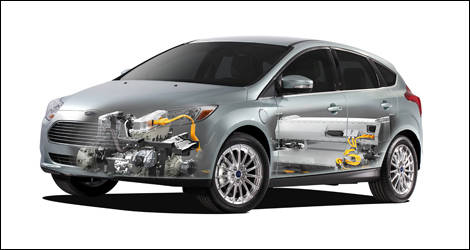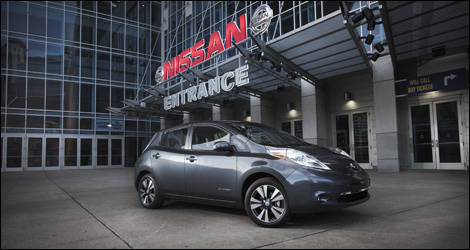Are you ready to starve the greedy oil barons? Is the purchase of your very own EV on the cards? If so, let's review some of the issues you need to cover before making your big decision.
Your daily usage
Whether you like it or not, an EV doesn't have the same range as a traditional gas-powered vehicle. It requires a different routine than the typical 15-minute fuel stop. In order to determine if an EV is the right vehicle for day-to-day use, you will need to make a conservative assessment of the battery range.
Subtract 20% right off the bat to compensate for variables in order to give you a little leeway. In addition, you need to subtract a further 30% for our rigorous climate and your bad passenger compartment heating and cooling habits. Subtract yet another 20% for battery-wear over the next five years. You now have 30% available for your daily driving requirements.
Don't be discouraged! If you apply this math to the Nissan LEAF's 160-km autonomy, you are left with 48 kilometres for your daily travels.
When all is said and done, do you travel more than 80 kilometres daily?
Weekend outings
The first issue that comes to mind is a long weekend drive. Do you go on that that 300-km scenic drive every weekend? If you happen to go on long scenic drives only once or twice a year, why not consider renting or borrowing a gas-powered vehicle? Chances are the savings you've accumulated the other 51 weeks of the year will be much more than you need to cover this occasional expense.
Charging station access
The EV mantra states that you must start your day with a full charge. You will need to access a power outlet at home, a 220-Volt outlet is best. The latter will reduce your charging time by 65% versus a 110-Volt outlet.
As far as public charging stations go, there is a public network sprouting up faster than we can keep track. Whether it’s the 150-station, 28-partner electric circuit at circuitelectrique.ca in Quebec (as of March 4, 2013, or the 100-station network serving the Vancouver area, every region has its own plan. So, get to know the one in your area.
A brief summary of the different warranties
Ford does not mention any specific battery warranty, and their overall warranty spans 3 years. Nissan offers 5 years, while mentioning an 80% residual battery capacity expectancy under normal use. Mitsubishi rules the roost with their 8-year battery warranty for the i-MiEV, although some conditions may apply.
For more information, consult the EV file and we recommend you read the Should we worry about the battery? article.
Source: autonomyaccordingtoweather
Note: I observed a 30% drop in the Nissan LEAF battery autonomy used for heating the passenger compartment during the 2013 Montreal International Auto Show test-drive event. There was a cold spell that week with temperatures averaging -20℃, or -35℃ with the wind-chill factor.
Your daily usage
Whether you like it or not, an EV doesn't have the same range as a traditional gas-powered vehicle. It requires a different routine than the typical 15-minute fuel stop. In order to determine if an EV is the right vehicle for day-to-day use, you will need to make a conservative assessment of the battery range.
Subtract 20% right off the bat to compensate for variables in order to give you a little leeway. In addition, you need to subtract a further 30% for our rigorous climate and your bad passenger compartment heating and cooling habits. Subtract yet another 20% for battery-wear over the next five years. You now have 30% available for your daily driving requirements.
 |
| 2012 Ford Focus Electric (Photo: Ford) |
Don't be discouraged! If you apply this math to the Nissan LEAF's 160-km autonomy, you are left with 48 kilometres for your daily travels.
When all is said and done, do you travel more than 80 kilometres daily?
Weekend outings
The first issue that comes to mind is a long weekend drive. Do you go on that that 300-km scenic drive every weekend? If you happen to go on long scenic drives only once or twice a year, why not consider renting or borrowing a gas-powered vehicle? Chances are the savings you've accumulated the other 51 weeks of the year will be much more than you need to cover this occasional expense.
Charging station access
The EV mantra states that you must start your day with a full charge. You will need to access a power outlet at home, a 220-Volt outlet is best. The latter will reduce your charging time by 65% versus a 110-Volt outlet.
As far as public charging stations go, there is a public network sprouting up faster than we can keep track. Whether it’s the 150-station, 28-partner electric circuit at circuitelectrique.ca in Quebec (as of March 4, 2013, or the 100-station network serving the Vancouver area, every region has its own plan. So, get to know the one in your area.
 |
| 2013 Nissan Leaf (Photo: Nissan) |
A brief summary of the different warranties
Ford does not mention any specific battery warranty, and their overall warranty spans 3 years. Nissan offers 5 years, while mentioning an 80% residual battery capacity expectancy under normal use. Mitsubishi rules the roost with their 8-year battery warranty for the i-MiEV, although some conditions may apply.
For more information, consult the EV file and we recommend you read the Should we worry about the battery? article.
Source: autonomyaccordingtoweather
Note: I observed a 30% drop in the Nissan LEAF battery autonomy used for heating the passenger compartment during the 2013 Montreal International Auto Show test-drive event. There was a cold spell that week with temperatures averaging -20℃, or -35℃ with the wind-chill factor.


